Ba – Jonás se fue y se sentó en un lugar al este de la ciudad 4: 4-11
Jonás se fue y se sentó
en un lugar al este de la ciudad
4: 4-11
Jonás se fue y se sentó en un lugar al este de la ciudad ESCUDRIÑAR: ¿Cuál es la pregunta más importante en el libro? ¿Por qué Dios plantea preguntas como esta? Hablando humanamente, ¿por qué Jonás tenía todo el derecho de estar enojado? ¿Por qué deberíamos estar complacidos de que Dios sea lento para la ira? ¿Por qué se sentó Jonás fuera de la ciudad? ¿Cuál fue su esperanza? ¿Qué tipo de refugio construyó? ¿Qué tenía esto que ver con la historia de Israel? ¿Qué tres cosas provee Dios a Jonás? ¿Por qué? ¿Qué revelan la calabacera, el gusano y el sol ardiente acerca del SEÑOR? ¿y acerca de Jonás? ¿Cómo el gusano en esta séptima escena señala a Jonás como un tipo de Cristo? Compare el encuentro de Elías con la adoración a Baal en Primera Reyes 18: 20-40 con la relación de Jonás con estos paganos. ¿Qué experiencias religiosas, depresiones, provisiones y reproches de Dios tienen en común entre sí? ¿y con usted? ¿Qué nos dice esta escena acerca de Dios? ¿Cómo terminaría esta historia que queda pendiente? ¿Por qué? ¿Qué cree que hizo el profeta descontento con su segunda oportunidad? ¿Qué dice en general la escena siete acerca de Dios?
REFLEXIONAR: ¿Tiene un lugar donde quejarse? ¿Está decepcionado o molesto con Dios en este momento? ¿Cómo es eso? ¿Cuál es la importancia de la pregunta de Dios en 4:4 para usted personalmente? Como resultado de su intervención divina, ¿Dios ha revelado una distancia entre Su corazón y el suyo? ¿Cómo es eso? ¿Hay alguna prioridad fuera de lugar que haya tenido lugar en su vida últimamente? ¿Qué le dejó clara esta disparidad? ¿Cómo se siente acerca de la idea de que Dios puede permitir que las dificultades transmitan instrucción espiritual? ¿Por qué cree que el Enemigo de las almas puede querer disfrazar la dificultad usada por YHVH como castigo enviado por Dios? Si ha tenido una serie de sus propias dificultades, ¿las ha atribuido a ADONAI o al Adversario? ¿Cómo le han hecho sentir estos casos? ¿las dificultades lo han acercado más al Señor o lo han alejado? ¿Por qué? ¿Cuándo ha tratado de limitar la misericordia del Señor a los demás? ¿Y a usted mismo? ¿A quién quiere ADONAI que muestre misericordia esta semana?
Breve descripción de la escena siete: ADONAI inicia la acción en esta escena final, esta vez con una pregunta dirigida al profeta descontento. Pero el SEÑOR quería que Jonás continuara su ministerio profético, así que, en un reproche suave y amoroso: YHVH le respondió: ¿Haces bien en enojarte tanto? (4:4) a la luz de la misericordia que Te he mostrado al traerte de vuelta a la vida para que puedas cumplir Mi comisión. Seguramente el siervo de Dios podría confiar en que ¿Acaso el Juez de toda la tierra no hará justicia? (Génesis 18:25b). Jonás, sin embargo, no estaba de humor para responder. Se negó a reconocer cualquier sugerencia de que podría estar equivocado, y persistió descaradamente en justificarse a sí mismo.97
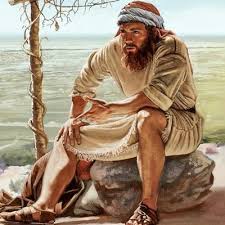 Y salió Jonás de la ciudad y se sentó al oriente de ella. Allí se hizo una enramada y se sentó a su sombra hasta ver qué sucedería en la ciudad (4:5). Él tomó una nueva posición al oriente de la ciudad donde construyó un puesto para proporcionarse algo de sombra. Nuevamente, el SEÑOR Dios toma la iniciativa proporcionando una calabacera, un gusano y un viento; Jonás reacciona con otro deseo de muerte (4:6-8). La historia concluye con un intercambio de preguntas y respuestas entre Dios y Jonás (4:9) y luego con una disertación de treinta y nueve palabras del SEÑOR (4:10-11), equilibrando la disertación de treinta y nueve palabras de Jonás en 4:2. El final de la historia se enlaza con el principio, retomando el tema: Nínive, la gran ciudad. La pregunta final invita a Jonás, y a cada uno de nosotros, a participar, respondiendo con una respuesta.98
Y salió Jonás de la ciudad y se sentó al oriente de ella. Allí se hizo una enramada y se sentó a su sombra hasta ver qué sucedería en la ciudad (4:5). Él tomó una nueva posición al oriente de la ciudad donde construyó un puesto para proporcionarse algo de sombra. Nuevamente, el SEÑOR Dios toma la iniciativa proporcionando una calabacera, un gusano y un viento; Jonás reacciona con otro deseo de muerte (4:6-8). La historia concluye con un intercambio de preguntas y respuestas entre Dios y Jonás (4:9) y luego con una disertación de treinta y nueve palabras del SEÑOR (4:10-11), equilibrando la disertación de treinta y nueve palabras de Jonás en 4:2. El final de la historia se enlaza con el principio, retomando el tema: Nínive, la gran ciudad. La pregunta final invita a Jonás, y a cada uno de nosotros, a participar, respondiendo con una respuesta.98
Comentario sobre la escena siete: Después de escuchar la perorata llorona de Jonás, hubo un silencio mortal, una pausa, el tiempo suficiente para preguntarse qué pasaría a continuación. Pero ahora, la breve pausa ha terminado y el silencio se rompe con una palabra del SEÑOR. Por primera vez escuchamos una conversación entre Dios y Jonás. Su pregunta: ¿Haces bien en enojarte tanto? es la pregunta más importante en el libro. YHVH quiere saber si la ira de Jonás resulta en algo bueno. Las preguntas divinas nunca son para el beneficio de Dios. Él conoce la respuesta a cada pregunta (Génesis 3:6-11; 4:3-10; Juan 6:5-6). Plantea preguntas que podemos realizar y estar de acuerdo con la verdad de la respuesta. Responder a las preguntas de Dios requiere una búsqueda del alma que pueda descubrir problemas del corazón que antes no reconocíamos, lo que nos ayuda a ver en nosotros mismos lo que Dios busca mostrarnos. La pregunta que Dios le hizo a Jonás es el mismo Espíritu que nos susurra mientras nos tambaleamos a punto de caer precipitadamente en un montículo de ira. Después de todo el abatimiento y la furia, nos enfrentamos a esta misma simple pregunta.99
Querido Justo y Recto Padre Celestial, te alabo porque siempre eres perfecto en Tu ministración de ira y amor. Te enojas (Juan 3:36). La ira en Tus hijos se les permite cuando es una ira justa contra el pecado, “Airaos, pero no pequéis” (Efesios 4:26a); no una ira egoísta por no obtener lo que alguien quiere. Sea quitada de vosotros toda amargura y enojo, e ira, y grito airado y maledicencia, junto con toda maldad (Efesios 4:31).
Te alabamos porque abres la puerta de la salvación y la entrada al cielo a todos Tus hijos. Así que la ley ha sido nuestro tutor hasta el Mesías, para que por medio de la fe fuéramos declarados justos. Y habiendo venido la fe, ya no estamos bajo tutor, pues todos sois hijos de Dios por la fe en Jesús el Mesías. Porque todos los que fuisteis bautizados en el Mesías, del Mesías estáis revestidos. No hay judío ni griego, no hay siervo ni libre, no hay varón ni hembra: porque todos vosotros sois uno solo en Jesús el Mesías (Gálatas 3:24-28). Alabado seas Yeshua por Tu maravilloso regalo de Tu justicia a todos los que aceptan Tu sacrificio como el Cordero de Dios por nuestros pecados. Al que no conoció pecado, por nosotros lo hizo pecado, para que nosotros llegáramos a ser justicia de Dios en Él (2 Corintios 5:21). ¡Te amamos y viviremos contigo en el cielo, alabando Tu grande y santo nombre por siempre! En el santo nombre de Yeshua y el poder de Su resurrección. Amén.
Humanamente hablando, Jonás tenía una razón para estar enojado. Después de todo, Asiria era el archienemigo de Israel, y predicarles posiblemente podría evitar que fueran destruidos si ellos se arrepintieran. En el año 722 aC, aproximadamente treinta y ocho años después de que Jonás predicó a Nínive, el ejército de Asiria saqueó el reino del norte de Israel y puso sitio a Samaria. Y el rey de Asiria trajo gente de Babilonia, de Cuta, de Ava, de Hamat y de Sefarvaim, y los hizo habitar en las ciudades de Samaria, en lugar de los hijos de Israel. Así ocuparon Samaria, y habitaron en sus ciudades (Segunda Reyes 17:24). Los asirios trataron a sus pueblos conquistados de manera diferente a como lo harían los babilonios más adelante en la historia. Mientras que los babilonios se llevaron a los mejores y más brillantes a Babilonia y mataron al resto, los asirios trajeron a sus propios ciudadanos al área conquistada, se casaron con ellos y, por lo tanto, los asimilaron a la cultura asiria. Esto es, por supuesto, lo que Jonás había temido que sucediera. Finalmente, los judíos en el reino del sur de Judá vieron a sus hermanos del norte como mestizos inferiores, los despreciaban y no querían tener nada que ver con ellos (vea el comentario sobre La vida de Cristo Gw – La parábola del buen samaritano).
Como se mencionó anteriormente (vea Az – La ira de Jonás y la misericordia del SEÑOR), Jonás dijo que Dios era lento para la ira. ¿No estamos contentos de que ese sea el caso? Si Él estuviera inclinado a los arrebatos de ira, todos nosotros estaríamos sufriendo cada momento del día. Cada forma de consuelo nos muestra que ADONAI tiene una tendencia a otorgar misericordia. Saber que el Dios santo y todopoderoso podría estar enojado y, sin embargo, ser lento para la ira, debería hacernos reconsiderar cualquier enojo que sintamos cuando somos traicionados, menospreciados o simplemente ignorados. Esto debería hacer que pensemos en dos cosas: Primero, deberíamos cuestionarnos cualquier enojo que sintamos hacia Dios. Sabiendo que Él puede y debe estar enojado con nosotros, y sin embargo, decide no estarlo, debería desafiarnos a repensar nuestra posición. En segundo lugar, cuando nos damos cuenta de la brecha entre el carácter de ADONAI y el nuestro, debemos considerar nuestra gran necesidad de la ayuda de Dios para moldearnos a Su imagen (Romanos 8:29; Primera a los Corintios 15:49 y Colosenses 3:10).
Dado que, desde una perspectiva humana, podemos sentirnos justificados en nuestra ira hacia otro o incluso hacia Dios (Ha`Shem), la única forma en que podemos ser lentos para la ira es si el Espíritu Santo (Ruaj HaKodesh) nos induce en esa dirección. El SEÑOR nos dio Su Espíritu por muchas razones: compañerismo, consuelo, comunión, guía y consejo para nombrar algunos. Pero también nos dio su Espíritu Santo para el empoderamiento. Como creyentes, debemos estar facultados para vivir para Él, más allá de nuestras capacidades humanas normales. Si bien nunca lograremos la perfección en ninguno de los atributos de Dios, podemos experimentar la obra del Espíritu Santo en una medida cada vez mayor. En otras palabras, podemos ser santificados. Podemos y debemos esperar ver el fruto de la obra de Dios en nuestras vidas cuando Él nos cambia diariamente (Gálatas 5:16-23).
Pero en lugar de responder a ADONAI, Jonás salió de la ciudad y se sentó al oriente de ella (4:5a). Dios trató de involucrar a Su profeta en su angustia, pero Jonás no estaba listo para hablar (Él responde la pregunta cuando se le pregunta nuevamente en 4:9). A Caín se le hizo la misma pregunta en Génesis 4:6, él tampoco contestó, pero en lugar de eso salió y mató a su hermano Abel (vea el comentario sobre Génesis Bj – Desde la tierra, la sangre de tu hermano reclama justicia). Jonás estaba en un punto similar de decisión moral en su relación con Dios.
Y salió Jonás de la ciudad y se sentó al oriente de ella. Allí se hizo una enramada y se sentó a su sombra hasta ver qué sucedería en la ciudad (4:5). Jonás esperaba que el SEÑOR aún destruyera la ciudad a pesar del arrepentimiento de los ninivitas. Entonces, en caso de que eso ocurriera, el profeta renuente no quería estar en la ciudad, por supuesto, así que se dirigió a una colina en el este, fuera de la ciudad, para esperar los cuarenta días. Esperó a ver si los ninivitas se arrepentían y la misericordia de Dios perduraba. Allí se hizo una enramada (hebreo: sukká) para proteger su blanca piel, que sin duda era dolorosamente sensible al sol. Este refugio recordaba al refugio construido en el desierto por los israelitas mientras vagaban por cuarenta años. ADONAI ordenó que estos refugios se construyeran cada año como un recuerdo (la fiesta de las cabañas o Sukkót) de la provisión de Dios para Su pueblo durante esos años de peregrinación por el desierto (Éxodo 23:16, 34:22; Levítico 23:39-43; Deuteronomío 16:13-16). Entonces Jonás se sentó a su sombra hasta ver qué sucedería en la ciudad desde la distancia (4:5b). Cuando pensó que Dios podría destruir a los malvados ninivitas, es probable que le trajera una sonrisa a su cara. Sí, todavía existía la posibilidad de que se hiciera justicia estricta.
Una lección ilustrada: Y YHVH ’Elohim preparó una lección objetiva para demostrar Su misericordia y compasión. Observe que, en cada una de las coyunturas cruciales del libro, se usa el título expandido YHVH ’Elohim (ADONAI Dios) (1:9, 2:1, 2:6 y aquí). Encaramado allí como un buitre en el borde de la ciudad a la espera de su destrucción, el sol golpeó sin piedad al profeta descontento. Sentado en su cabaña, el techo probablemente proporcionaba poca protección. Debió ser miserable tener que hornear bajo los deslumbrantes rayos del sol. Así que YHVH ’Elohim preparó una calabacera para que creciera sobre la cabeza de Jonás y le hiciera sombra y lo librara de su malestar (4:6a). Es interesante que, en este libro tan corto, la palabra preparó se usa cuatro veces para hablarnos sobre hechos especiales de Dios. Primero preparó YHVH un gran pez, luego preparó, luego preparó un gusano, y finalmente ADONAI preparó un sofocante viento del este (Jonás 1:17, 4:6, 7-8), todo para propósitos especiales relacionados con el llamado de Jonás y ministerio.100
Y YHVH ’Elohim preparó una calabacera para que creciera sobre la cabeza de Jonás y le hiciera sombra y lo librara de su malestar. Y Jonás se alegró grandemente por la calabacera (4:6). La planta (en hebreo: quicayón) es aparentemente difícil de identificar, pero el nombre hebreo es similar a un nombre egipcio para la planta de aceite de ricino, conocido por su rápido crecimiento, altura y hojas grandes. Dios proveyó una planta frondosay la hizo crecer sobre Jonás en una noche. Sin embargo, es muy dudoso que crezca esto rápidamente en una noche. Lo más probable es que fuera una planta milagrosa y Jonás estaba extremadamente feliz con la planta (4:6c). Jonás, por cierto, usó la misma palabra cuando se describió a sí mismo como extremadamente infeliz (que se traduce: enojó en gran manera), ante la decisión de Dios de salvar a Nínive (4:1). De hecho, la misma palabra hebrea gadol también se usa para describir a Nínive como una gran ciudad, la tormenta como una gran tormenta y el gran pez (Jonás 1:2, 1:12 y 1:17). A Jonás aparentemente le gustaba usarlo. Para el caso, todas sus experiencias fueron tan fuera de lo común como para requerir que los superlativos las describieran. Estaba furioso por la protección divina dada a los demás, pero excitado y emocionado de recibir un poco de su propia protección divina.
Ahora admito que no soy yo quien juzga a Jonás. Soy muy consciente de cómo un cambio en la temperatura puede devolver una sonrisa a mi cara. No soporto el frío, y cuando tengo calor, supongo que puedo estar tan feliz como Jonás con su planta. Así que puedo relacionarme con un cambio tan simple que me permite compararlo con mi falta de preocupación por cosas de mayor importancia. Las interrupciones divinas tienen una forma de hacerme más consciente de mi corazón inconsistente. Cuando estoy emocionado de que mis propias necesidades sean satisfechas, pero no estoy tan ansioso por ver los propósitos de Dios cumplidos, es evidente que tengo algo que hacer. Las interrupciones divinas a menudo exponen mi falta de sensibilidad hacia Sus propósitos y estar absorto en mis sentimientos. Cuando lo insignificante hace latir mi corazón, mientras que lo verdaderamente significativo se encoge de hombros, es asombrosamente claro que tengo un largo camino por recorrer.
La frase lo librara de su malestar significa literalmente liberarlo de su calamidad. El idioma hebreo aquí invita a una comparación de tres vías entre la primera calamidad de Jonás en la tormenta, la calamidad pendiente de Nínive y la incomodidad de Jonás con el sol. Estaba extremadamente feliz y agradecido por su resurrección de entre los muertos. También Jonás se alegró grandemente por su liberación de la incomodidad del sol. Ahora usted pensaría que habría ablandado el corazón de Jonás hacia los ninivitas. Una vez más, ADONAI le mostró un favor divino a Jonás, y sin embargo él, dudaba en ofrecer misericordia a los demás. YHVH usa este contraste en Su pregunta final a Su profeta elegido.
¿Estamos dispuestos a extender la gracia y la misericordia a los demás como el SEÑOR nos la ha extendido? Cuando Dios amablemente atiende nuestras necesidades, cuando ADONAI está presente a través de nuestra incomodidad o calma nuestras ansiedades, nuestra primera inclinación debe ser extender la gracia y la misericordia a los demás. Su gracia debería hacernos más bondadosos con los demás, y Su misericordia también debería hacernos más misericordiosos (Segunda a los Corintios 1:3-4). ¿Con qué frecuencia ve esto desplegado dentro o fuera de las congregaciones de Dios?
Pero al amanecer del día siguiente ’Elohim preparó un gusano, el cual hirió la calabacera, y se secó (4:7). Pero… ’Elohim…Aquí hay otro “Pero”, y ahora es el movimiento del Gran Maestro. Dios es soberano y se aseguró de que la extrema alegría de Jonás sobre la sombra durara solo un día. Se dice que la planta de aceite de ricino crece rápidamente y se deteriora rápidamente, pero una vez más, esto parece haber sido un gusano milagroso para destruirla tan rápido. El énfasis aquí no está en el amor y la misericordia de ADONAI, sino en Su actividad disciplinaria. Dios tenía una lección especial que Su profeta debía aprender.
Tipo 7. El gusano también era distintivo en otro sentido, aunque esto difícilmente podría haber sido obvio para el propio Jonás en ese momento. Era conocido como “el gusano rojo” (hebreo: tola), por ser la fuente del líquido rojo que se usaba en esos días para producir hermosas telas carmesí y escarlata. De hecho, la misma palabra fue traducida como “carmesí” en Isaías 1:18, al hablar de los pecados como “rojo como el carmesí”. Lo más sorprendente de esta palabra es que se usa proféticamente aplicada a Cristo en la cruz en el maravilloso Salmo 22, allí dice: “Pero yo soy gusano” (Salmo 22:6a). No cualquier gusano, sino el gusano escarlata, cuyo fluido rojo sangre emerge del cuerpo del gusano hembra cuando muere al dar a luz a su cría, apunta con elocuencia a la sangre derramada de Yeshua el Mesías cuando murió para darnos vida (Romanos 5:8).101
Con la sombra de las hojas de la planta (desaparecida de repente), Jonás fue sometido nuevamente al calor abrasador del desierto asirio. Y aconteció que al salir el sol, ’Elohim envió un sofocante viento oriental, y el sol hirió la cabeza de Jonás, de modo que se desmayaba y deseaba morir, y dijo: ¡Más me vale morir que vivir! (4:8). Jonás ahora está completamente agotado; estaba absurdamente contento con la provisión de la planta, y ahora también, como toda su aspiración religiosa, se había secado. El SEÑOR había dado y ahora el SEÑOR había quitado (Job 1:21).102 Jonás casi tuvo una insolación y el sol “hirió” la cabeza. Utilizó la misma palabra raíz que en el versículo 7 cuando un gusano “hirió” la calabacera para indicar el viento “abrasador” del este. Jonás sintió que podía secarse bajo el sol caliente justo como la planta se había secado debido al gusano. No solo había sido enviado a una misión que no quería, y estaba disgustado por el resultado, sino que ni siquiera podía encontrar un lugar cómodo para recuperarse.
Jonás no solo estaba emocionalmente agotado, también estaba físicamente atormentado. Nada parecía irse de allí. Estaba tan angustiado que, por segunda vez (4:3), consideró que la muerte era más adecuada que la vida,103 y dijo: ¡Más me vale morir que vivir! (4:8b). Los encuentros con la planta, el gusano y el viento no le habían enseñado nada, y él no cambió su deseo de morir. En tres versículos, Jonás pasó de la ira a la felicidad, y luego volvió a la depresión. Para entonces ya estaba listo para escuchar a ADONAI de nuevo.
Una lección verbal: el libro concluye con una pregunta para Jonás sobre la motivación de Dios. YHVH se acercó a Jonás y le preguntó: ¿Tanto te irritas por lo de la calabacera? (4:9a). La suave pregunta, como un pinchazo a la conciencia, se encuentra con la auto justificación: ¡Tengo razón para irritarme hasta la muerte! Yeshua describió la misma actitud en el hijo mayor de la parábola, quien se ofendió por la alegre recepción que le dio a su hermano: Y se enojó y no quería entrar. Saliendo entonces su padre, le rogaba. Pero él respondió al padre diciendo he aquí, tantos años te sirvo y jamás quebranté un mandato tuyo… (Lucas 15:28-30). El último comentario no fue cierto para Jonás, pero ambos hombres estaban preocupados por vindicarse. Estaban firmemente convencidos de sus propios motivos de duda. Pero las últimas palabras de Jonás fueron literalmente de muerte: ¡Más me vale morir que vivir! (4:8). Al cuestionar y discutir con ADONAI, se pierde de vista todo lo que hace que la vida valga la pena.104
Y luego, con una oración de treinta y nueve palabras (en hebreo) que equilibró la oración de treinta y nueve palabras de Jonás (en hebreo) en 4:2, ADONAI termina el libro enseñándole a Jonás la lección esencial que él había estado perdiendo todo el tiempo. No solo fue un Dios de absoluta santidad y perfecta justicia que de ningún modo justifica al culpable (Éxodo 34:7b), sino que guarda la misericordia a millares, que carga con la iniquidad, la transgresión y el pecado (Éxodo 34:7a). Le dijo YHVH a Jonás: Te apiadaste de la calabacera, por la cual no trabajaste ni la hiciste crecer, que en una noche nació y en una noche pereció (4:10). Como Abraham, Moisés y Jeremías, el renuente profeta protestó ante ADONAI. Su queja llegó en 4:1 cuando los ninivitas se arrepintieron (3:10). Es como si el Señor dijera: “Analicemos esta ira tuya, Jonás… Representa tu preocupación por la planta que tanto amabas, pero ¿qué significó esto realmente para tí? Su apego a eso no pudo haber sido muy profundo, porque estuvo un día y desapareció al siguiente. Tu interés fue dictado por tu interés propio, no por el amor genuino. Nunca tuviste la devoción de un jardinero. Si tu se siente tan mal como dices, ¿cómo esperarías que se sintiera el verdadero Jardinero, ¿quién cuidó la planta y la vio crecer solo para verla secarse y morir? Así es como Yo me siento con respecto a Nínive, pero mucho más. Todas esas personas, todos esos animales…Yo los hice. Los he apreciado todos estos años. Nínive Me ha costado un sinfín de esfuerzos, y esto significa el mundo para Mí. Tu dolor no es nada comparado con el Mío cuando pienso en la destrucción de ellos“.105
Reflexión sobre lo que la escena siete dice en su totalidad acerca de ADONAI: El último versículo nos ofrece una mirada al corazón de Dios cuando dijo: ¿Y no tendré Yo piedad de Nínive, esta gran metrópoli, donde hay más de ciento veinte mil personas que no saben distinguir entre su mano derecha y su izquierda, además de muchos animales? (4:11). Por segunda vez, ADONAI le hizo una pregunta a Jonás. ¿Está obligado el Creador a pedir permiso a Jonás para ejercer Su misericordia? La pregunta irónica está destinada a llevar a Jonás a un estado de ánimo arrepentido. ¿Realmente quiere Jonás encontrar faltas en su Dios por ser demasiado bondadoso y amoroso?106
Si esta es una referencia a los niños que son demasiado pequeños para distinguir su mano derecha de su mano izquierda y, por lo tanto, inocentes del pecado y que no merecen la muerte, entonces la población total del triángulo asirio (formada por Nínive y sus ciudades satélites de Rehoboth-Ir, Cala y Resen) habrían sido alrededor de 600.000 habitantes. La preocupación de ADONAI fue por todas las personas por quienes tanto Dios como Jonás ministraron. Dios trabajó a través de Su gracia y Jonás trabajó a través de sus experiencias. A la primera pregunta, Jonás se alejó rezongando y se negó a responder (4:4-5). Esta vez la falta de una respuesta inmediata nos deja pendientes por la respuesta.
Jonás se abstiene de agregar cualquier cosa que pueda menoscabar la fuerza de la pregunta con la que Dios concluye el libro. Si Jonás estaba convencido o no, y lo que le sucedió después, son asuntos sin importancia en comparación con la lección que se enseña tan convincentemente. ¡Pero si el profeta rebelde no hubiera aparecido, tal libro nunca se habría escrito! Jonás no tenía derecho al favor de Dios, entonces, ¿quién era él para negárselo a alguien más? La respuesta a la pregunta del Gran Maestro en 4:11 sin duda terminó siendo “Sí”, y ese “sí” expresa un énfasis único en el libro de Jonás. Toda la Biblia cuenta la historia del amor de Dios por los que están dentro, los justos del TaNaJ y los santos del Nuevo Pacto. Pero el libro de Jonás tiene una preocupación especial por el amor de ADONAI por las personas del mundo, e incluso por sus animales.107
Cuando se enfrente a circunstancias difíciles, sepa que puede correr a un lugar secreto: Porque Él me esconderá en su refugio en el día del mal, Me ocultará en lo reservado de su Tienda. Me pondrá en alto sobre una roca. Inclina a mí tu oído y rescátame pronto, ¡Sé Tú mi roca fuerte y la fortaleza para salvarme! (Salmo 27:5 y 31:20). Como en el ojo de la tormenta, la paz prevalece en presencia de ADONAI, incluso cuando el caos surge a su alrededor. Dios tiene un lugar sagrado de inmunidad contra cualquier cosa que no sea Su voluntad para nosotros. Él se encontrará con usted allí, ofreciéndole lo mejor de Sí mismo y Sus propósitos. Considere las circunstancias de su vida como lecciones divinas. Pídale al Señor que abra sus ojos para ver lo que Él puede estar enseñándole. Luego abra su corazón para recibir y retener esas lecciones.108



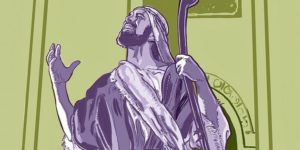 Jonás explica su enojo. ¡Oh YHVH! ¿No era esto lo que decía yo estando aún en mi tierra? (4:2a).
Jonás explica su enojo. ¡Oh YHVH! ¿No era esto lo que decía yo estando aún en mi tierra? (4:2a). 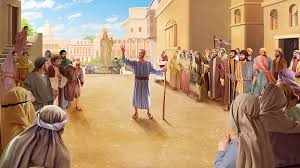 Mientras el desconocido visitante predicaba pesimismo, los ninivitas creyeron en Dios. Y los hombres de Nínive creyeron a ’Elohim, y proclamaron ayuno y se cubrieron de cilicio, desde el mayor hasta el menor de ellos (3:5). Ellos creyeron
Mientras el desconocido visitante predicaba pesimismo, los ninivitas creyeron en Dios. Y los hombres de Nínive creyeron a ’Elohim, y proclamaron ayuno y se cubrieron de cilicio, desde el mayor hasta el menor de ellos (3:5). Ellos creyeron  Este capítulo se enfoca nuevamente en la relación del profeta descontento con ADONAI mientras dialogan sobre la ira de Jonás sobre la misericordia y la gracia mostradas por YHVH. Dios discute Su preferencia por la compasión, incluso en circunstancias horribles. El SEÑOR tiene compasión por Su creación, no importa cuán ignorante, abusiva o violenta sea la cultura. El libro de Jonás trata de esto, por lo que HaShem le da a Su sirviente reacio una lección objetiva en forma de planta. Intenta convencer a Jonás (y a nosotros) de que su respuesta de compasión es mejor que la justicia y más importante que la justicia estricta. Elohim, el Dios de la creación y la destrucción, argumenta que: “Si tú, Jonás, te conmueves por la destrucción de una planta que no creaste, ¿no debería Yo tener compasión por la destrucción de las personas y animales que creé? Dios ama a toda Su creación, porque es clemente y misericordioso (4:2).86
Este capítulo se enfoca nuevamente en la relación del profeta descontento con ADONAI mientras dialogan sobre la ira de Jonás sobre la misericordia y la gracia mostradas por YHVH. Dios discute Su preferencia por la compasión, incluso en circunstancias horribles. El SEÑOR tiene compasión por Su creación, no importa cuán ignorante, abusiva o violenta sea la cultura. El libro de Jonás trata de esto, por lo que HaShem le da a Su sirviente reacio una lección objetiva en forma de planta. Intenta convencer a Jonás (y a nosotros) de que su respuesta de compasión es mejor que la justicia y más importante que la justicia estricta. Elohim, el Dios de la creación y la destrucción, argumenta que: “Si tú, Jonás, te conmueves por la destrucción de una planta que no creaste, ¿no debería Yo tener compasión por la destrucción de las personas y animales que creé? Dios ama a toda Su creación, porque es clemente y misericordioso (4:2).86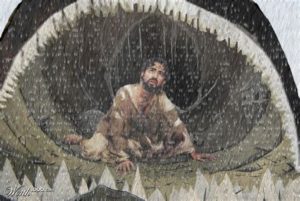 Entonces Jonás hizo su voto: Pero yo te ofreceré sacrificio de alabanza, Y cumpliré lo que prometí. ¡La salvación es de YHVH! (2:9). A ti ofreceré sacrificio de acción de gracias, E invocaré el nombre de YHVH (Salmo 116:17). De ti viene mi alabanza en la gran congregación, Cumpliré mis votos delante de los que lo temen Salmo 22:25 (y 116: 18). Su promesa era ir a Nínive y cumplir su comisión. Entonces, mirando hacia adelante a la segunda oportunidad, Él dijo, cuando llegue allí, diré: La salvación es de YHVH (Salmo 3:8a, Jonás 2:9).67 En la mayoría de los casos, la palabra hebrea voto implica un regalo prometido, no simplemente un curso de acción como lo implica la palabra en español. En otras palabras, Jonás no estaba simplemente aceptando ir a Nínive, sino que también estaba aceptando regresar a Jerusalem (Yerushalayim) para ofrecerle al SEÑOR el sacrificio ritual apropiado en el Templo. Se refería específicamente a la ofrenda de paz (vea el comentario sobre
Entonces Jonás hizo su voto: Pero yo te ofreceré sacrificio de alabanza, Y cumpliré lo que prometí. ¡La salvación es de YHVH! (2:9). A ti ofreceré sacrificio de acción de gracias, E invocaré el nombre de YHVH (Salmo 116:17). De ti viene mi alabanza en la gran congregación, Cumpliré mis votos delante de los que lo temen Salmo 22:25 (y 116: 18). Su promesa era ir a Nínive y cumplir su comisión. Entonces, mirando hacia adelante a la segunda oportunidad, Él dijo, cuando llegue allí, diré: La salvación es de YHVH (Salmo 3:8a, Jonás 2:9).67 En la mayoría de los casos, la palabra hebrea voto implica un regalo prometido, no simplemente un curso de acción como lo implica la palabra en español. En otras palabras, Jonás no estaba simplemente aceptando ir a Nínive, sino que también estaba aceptando regresar a Jerusalem (Yerushalayim) para ofrecerle al SEÑOR el sacrificio ritual apropiado en el Templo. Se refería específicamente a la ofrenda de paz (vea el comentario sobre 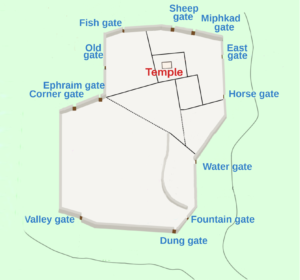

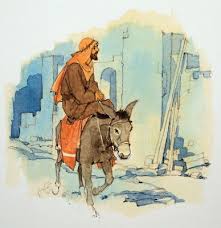
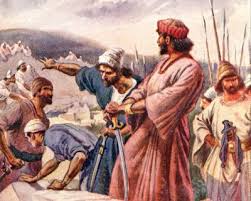
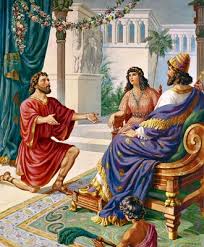
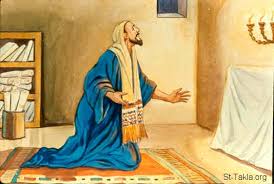

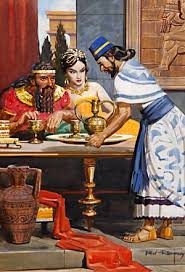
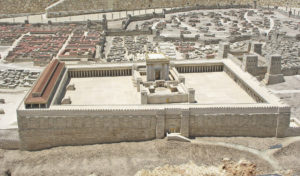




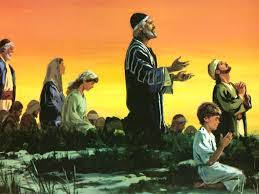
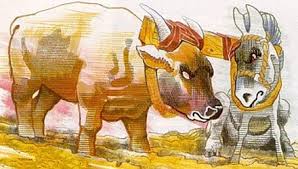


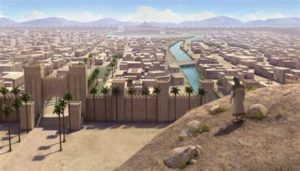 La segunda comisión de Jonás se vuelve más específica que la primera, ya que ahora se le dan las mismas palabras para decir: Levántate y vete a Nínive, la gran metrópoli, y proclama en ella el mensaje que Yo te daré (3:2). El mandato de ir se expresa en hebreo con dos palabras, dos verbos (levantarse y andar). Juntos significan “ve ahora”. O “ve inmediatamente”. Nínive, el nombre es siempre un símbolo poderoso de una ciudad mundana. Así como el Nuevo Pacto (Brit Hadashah) une Belén y Herodes el Grande, Gólgota con Poncio Pilato, Pablo con Roma, Jesús (Yeshua) y todos los reinos del mundo, también Jonás está vinculado con Nínive. Una vez más se identifica como una gran ciudad. Esta vez no se dice nada de la maldad de la ciudad.
La segunda comisión de Jonás se vuelve más específica que la primera, ya que ahora se le dan las mismas palabras para decir: Levántate y vete a Nínive, la gran metrópoli, y proclama en ella el mensaje que Yo te daré (3:2). El mandato de ir se expresa en hebreo con dos palabras, dos verbos (levantarse y andar). Juntos significan “ve ahora”. O “ve inmediatamente”. Nínive, el nombre es siempre un símbolo poderoso de una ciudad mundana. Así como el Nuevo Pacto (Brit Hadashah) une Belén y Herodes el Grande, Gólgota con Poncio Pilato, Pablo con Roma, Jesús (Yeshua) y todos los reinos del mundo, también Jonás está vinculado con Nínive. Una vez más se identifica como una gran ciudad. Esta vez no se dice nada de la maldad de la ciudad.